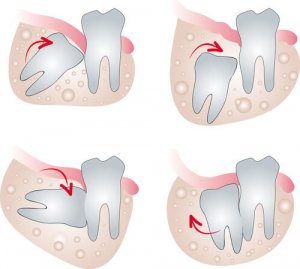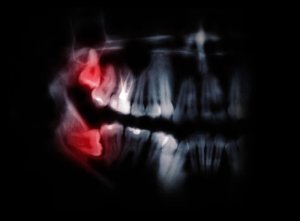Are you looking for wisdom tooth pain relief solutions or wondering how long the wisdom tooth pain will last? Wisdom teeth are notorious for the problems and pain they can cause, which is why removal is so common. Even then, it’s normal to experience some pain after extraction, too.
Fortunately, there are various ways to help get rid of wisdom tooth pain in your jaw or gum while a tooth is coming through, or following an extraction.
In this article, we explain some of the symptoms and causes, including why your wisdom tooth hurts and how to stop the pain if it’s affecting the oral health of you or someone you know.
Wisdom tooth pain symptoms before extraction
Wisdom teeth (or ‘third molars’) are located right at the back of your mouth. Most people have four, but you might have fewer than this or none at all. It’s also possible, although not as common, to have more than four wisdom teeth. Here we are going to focus on the different types of pain they cause, and how to find relief.

Wisdom teeth cause problems for many people and sometimes have to be removed. You might experience pain from:
- Eruption – A wisdom tooth coming through the gum — this often causes wisdom tooth pain when chewing
- Impaction – When a tooth aligns incorrectly during eruption and ends up pushing against the adjacent tooth
- Decay – This is common in hard-to-reach third molars
- Infection – Caused by partial impaction or decay
- Extraction – Pain may continue for a while after a tooth is removed
- Complication – Some issues after an extraction can be very painful
In the helpful video below, Dr. Bonnie Padwa describes some wisdom tooth pain symptoms and causes.
Whatever symptoms you experience, you should certainly mention any oral pain to your dentist at your next checkup. They will examine your mouth to determine the cause of the pain, and they may take an x-ray to see the position of any unerupted or partially erupted teeth.
Now let’s have a closer look at wisdom teeth pain and other symptoms. However, before getting started, we have some quick advice.
If the tooth pain is getting worse, you’re having trouble opening your mouth, or you have any of the signs of impaction or infection mentioned below, you should make an emergency dental appointment. If you’re in severe pain, are having trouble breathing or eating, or have swelling around your eyes, throat or neck, you should go to urgent care rather than waiting to see a dentist.
Do you want to find a dentist right now about your wisdom tooth pain? You can call 866-383-0748 and be connected to a live operator, 24/7. They’ll be able to put you in touch with a dentist near you. Alternatively, if you want to consult with a dentist online, you may want to explore your teledentistry options.
What does pain from wisdom teeth coming in feel like?
If none of your wisdom teeth have erupted yet, you might be wondering what does wisdom tooth pain feel like? Is that aching at the back of your mouth a cavity or is it from your wisdom teeth?
There are three main types of pain that result from wisdom teeth coming in:

- Jaw pain: A wisdom tooth will likely cause some jaw pain as it starts to grow. You’ll probably feel that pain in the back of your mouth as your wisdom teeth are growing in and can push your molars forward. If your wisdom teeth are misaligned, you might find that it’s harder to open your jaw without pain.
- Gum pain: As your wisdom teeth continue to grow, they may start to erupt from the gums, causing mild to significant gum pain. In addition to the pain, you may notice that your gum tissue has become red and swollen where your wisdom tooth is coming in.
- Headaches: Upper wisdom teeth can cause headaches by pressing against your sinuses as they grow. This headache is different from jaw and gum pain, and you may or may not experience all three when your wisdom teeth come in.
Though there are several ways it can hurt, any pain from a normal wisdom tooth eruption should be quite mild; perhaps just a dull ache. It’s similar to the teething pain that babies experience. More severe pain might be a sign of a complication like impaction or infection.
How long does wisdom tooth growing pain last?
After experiencing a few weeks of this, you may be wondering how long pain from wisdom teeth coming in lasts. Everyone has their own wisdom tooth pain timeline. Wisdom tooth eruption pain may begin before there are any external signs of the tooth appearing. Then, it can take several weeks or months for a wisdom tooth to fully break through the gum and grow into its correct position.
It’s common to experience some soreness and sensitivity while the crown of the tooth is erupting, especially if you bite down in that area. Once it has pushed through the gum, provided it is not impacted, it should stop hurting.
Some people only experience pain from their wisdom teeth growing for a relatively short time. For others, it may drag out for months or even years. If this is the case for you, you may want to find ways to treat your pain naturally, since it’s not ideal to keep taking painkillers for a sustained period of time.
It’s also possible for wisdom teeth to never erupt, but to remain quite happily under the gum and never cause any problems to the other teeth. So just because you have unerupted wisdom teeth, it doesn’t necessarily mean you’ll have to deal with painful wisdom teeth at some point.
Impacted wisdom tooth pain

Another source of pain is impacted wisdom teeth. When there isn’t enough room in your jaw for your them to erupt properly, wisdom teeth may grow at an angle and become impacted. They can be fully impacted (meaning they are still completely covered by gum) or partially impacted (meaning part of the tooth has emerged).
If your wisdom teeth become impacted as they erupt, it may cause pain in the adjacent teeth and jaw. You might also notice that part of the tooth is poking through the gum but it seems to have stopped coming through and is continuing to hurt. Your dentist will need to take an x-ray to check what’s going on beneath the surface.
Whether an impacted wisdom tooth hurts or not, your dentist may decide that extraction is the best option due to potential decay and pain down the road. Even if a wisdom tooth comes through straight, it can put pressure on the other teeth, meaning they gradually become crowded at the front.
Wisdom tooth pain from infection
You may be wondering if you are experiencing normal wisdom tooth growing pain or something more serious. Third molars can easily become infected, either because they haven’t erupted properly or because they are difficult to clean. If you can’t reach right to the back of the tooth to brush and floss it, this can lead to tooth decay, gum disease and eventually a tooth abscess.
Pain from a wisdom tooth infection is usually severe. You may also have a swollen, painful gum around your wisdom tooth, or even taste or see pus seeping from around the tooth. Additionally, if your wisdom tooth pain is accompanied by a sore throat, it’s most likely caused by an infection. You may also experience wisdom tooth pain in your cheeks due to infected glands.
In all of these cases, you should see a dentist right away. Schedule an emergency dentist appointment so your dentist can determine what is wrong and begin treatment as soon as possible.
How to relieve pain from wisdom teeth coming in

If you’re wondering how to get rid of wisdom teeth pain without visiting a dentist, you can try certain home remedies to reduce inflammation and tooth soreness. However, if your tooth keeps hurting, it’s best to visit a dentist. They will check what’s causing the pain and what, if anything, needs to be done about it.
In the case of infection, the dentist may first administer antibiotics and painkillers. Your dentist may choose to remove a tooth before you experience pain if x-rays show a high likelihood of impaction or complications.
This is a sort of preemptive wisdom tooth pain treatment and gets a head start on stopping the pain and preventing further infection or other problems.
Medication for wisdom tooth pain
Many people find that the best medicine for relieving wisdom teeth pain is ibuprofen, because of its anti-inflammatory properties. Acetaminophen, the active ingredient in Tylenol, can also be effective.
It’s safe to take both ibuprofen and paracetamol as wisdom tooth pain medication together, up to the maximum dose of each one. You should probably wait to see if your teeth still hurt after taking one or the other. That said, if you’re in this much pain and haven’t seen a dentist yet, you shouldn’t put off making an appointment.
You may be able to get stronger pain medication with an online dentist consult, without having to see a dentist in person. Denteractive offer this service via their video consultation. Alternatively, you can chat to one of their dentists for free – but you won’t be able to get a prescription with the free chat service.

If you have wisdom tooth gum pain, you may get more relief from a topical anesthetic treatment such as Orajel or Anbesol.
In the case that you are experiencing normal growing pain, you can use home remedies to manage the pain until your wisdom teeth are done coming in, or you have them removed.
Home remedies for wisdom teeth pain

If you prefer to use a natural remedy for wisdom teeth pain relief, salt water and clove oil are both effective.
Cloves have antibacterial, anesthetic and anti-inflammatory properties. You can apply diluted clove oil directly to the painful area for quick relief. A saltwater mouth rinse is also an effective way to kill bacteria and reduce any swelling.
Another simple remedy for wisdom tooth pain is to to place a cold compress on your jaw where it hurts. This will help reduce swelling and numb the area that hurts because of your wisdom tooth.
Read more about how to use these and other home remedies for toothache.
How to relieve wisdom tooth pain while pregnant
You might experience heightened problems with wisdom tooth pain during pregnancy because changes to the hormones in your mouth make it more susceptible to gum disease and infection.
If you’re planning to get pregnant, it’s best to have a dental checkup first so your dentist can check for potential problems that should be dealt with beforehand. Dentists generally avoid carrying out procedures like fillings and teeth extractions during pregnancy, if possible.
Why is pain worse at night?
There are a wide range of reasons why your wisdom tooth pain may be worse at night. The causes can include anything from wisdom tooth pain from an abscess to wisdom tooth pain in your jaw and ear from clenching or grinding. Try sleeping in an elevated position to relieve some of the pressure, and pursue professional help as you would with any toothache.
Pain after wisdom tooth removal surgery
The best thing for wisdom tooth pain caused by impaction or infection is often a tooth extraction. If your dentist can see that leaving the tooth in place is likely to cause further problems, they will recommend removing it.
Patients will not be in any pain while they are having their wisdom teeth removed because of anesthesia, but it’s natural to experience discomfort to the affected area after almost any kind of surgery. Opioids like OxyContin and Vicodin have long been prescribed for post-surgical pain relief for wisdom teeth patients and the medications do their job.
But regular use of these prescribed drugs can increase your tolerance and dependence and in some cases, long-term use can lead to addiction. Opioids may not be the best option for everyone.
With teenagers making up a large percentage of those who need their wisdom teeth removed, some oral health professionals have begun offering a pain relief option that is not addictive. It’s called Exparel and it contains a type of local anesthetic that only treats the surgical area.
One dose administered during surgery starts to work before the anesthesia wears off and provides up to 72 hours of pain relief that can be followed up with or supplemented with over-the-counter pain relievers like ibuprofen. Not everyone knows about this alternative option but check with your doctor to see if it’s available to you.
Dr. David Park, DDS, Utah Surgical Arts
Will wisdom tooth extraction hurt? Fortunately not. Thanks to either local or general anesthetic, wisdom teeth removal itself does not hurt in that moment. In fact, you have to be careful immediately following your surgery because you are still under the numbing effects of anesthetic and may not feel pain that indicates something is wrong!
Unfortunately, the pain doesn’t necessarily end there. Extracting third molars can be quite complicated because of the size and position of the teeth, and this often leads to swelling, discomfort and pain where the wisdom tooth used to be following the procedure.
How long does wisdom tooth pain after extraction last?
After your anesthetic has worn off, the extraction site itself will feel sore for several days. The rate of healing will depend on how large the wound is and whether you have stitches. Your dentist might prescribe you a course of antibiotics to prevent infection and will either supply painkillers, or inform you of the best over-the-counter painkillers for wisdom teeth pain relief.

You can read our article on wisdom teeth recovery for tips on caring for your mouth and reducing the chances of complications in the days after an extraction. For now though, here are a few basics for minimizing pain:
- Rest as much as possible and avoid strenuous exercise
- Don’t touch or poke the wound with your fingers or tongue
- Avoid hot or cold foods and drinks
- Don’t smoke, vape, or drink through a straw
- If using mouthwash or salt water to rinse, do so gently
- Brush very carefully around the extraction site
Finally, and most importantly, closely follow your dentist’s advice for protecting the wound and the blood clot that forms inside. If the blood clot becomes dislodged, you’ll experience intense pain from the exposed bone. This condition, known as ‘dry socket’, requires additional dental care.
Even after your gum is well on the way to healing, you might continue to experience nerve pain after your wisdom tooth extraction, especially if it was a complicated procedure. It takes time for your body to repair the trauma to your nerves, and it will be several months before your jaw bone has grown to fill in the hole where the tooth roots were.
If you feel like your pain is increasing in the days after an extraction, consult your dentist.

How to feel better after getting wisdom teeth removed
Really, the remedies for pain after wisdom tooth extraction are very similar to your options beforehand. The main difference is that you have to be more cautious with the extraction site. Your dentist will recommend an over the counter painkiller and offer tips on how to eat and sleep after wisdom teeth removal.
Wisdom teeth removal pain doesn’t last forever, but knowing what to expect, and how to prepare, can help with how you handle your post-op period. If possible, plan to take 1 or 2 days off work or school after surgery. Following wisdom teeth removal, the gum is normally sore from the time until anesthetic wears off until around three days later. However, sometimes the pain can hang on for 5 to 7 days after removal, or even a couple weeks.
Dr. Robert Berry, Mountain Aire Dentistry
As we said before, pain relief medication like ibuprofen will help relieving wisdom teeth pain and discomfort. Other home remedies include creating a warm mouth rinse with one cup of warm water with one tablespoon of salt. Swish the solution (gently!) around in your mouth for about 30 seconds then spit and repeat; ice the outside of your jaw where the pain is; and avoid sugary or hard foods.
As a quick recap, the following table has an overview of how to stop the pain before and after wisdom tooth extraction, according to the source:
| Cause of pain | Treatment | Pain relief options |
| Wisdom tooth growing | None if it’s growing correctly – just wait | Painkillers and other home treatments |
| Compaction | Extraction if it’s painful or affecting other teeth | Painkillers and other home treatments as an interim measure |
| Infection | Antibiotics to fight the infection; extraction as a last resort | Painkillers prescribed by dentist or over-the-counter |
| Extraction | Take special care while the wound heals | Painkillers and other home treatments |
Should I call my dentist?
If you feel better with medication and home remedies while your wisdom teeth are growing in, you probably don’t have to worry. As long as it isn’t affecting your life you can wait until your next checkup to talk to a dentist. When your pain is more severe and you have symptoms of impaction or infection, you will want to see a dentist soon and hopefully avoid a trip to the emergency room.

If you experience extreme wisdom tooth pain and have no insurance, don’t let that stop you from seeking help. Depending on your income you may be able to receive retroactive Medicaid to help you pay for your medical emergency bills. Read more about Medicaid insurance for low-income families.
After a procedure, you are certain to have some pain for a few days. This is totally normal, but starting around 5 to 7 days after wisdom teeth removal, pain starts to be more concerning. At this point it could still be healing pains, but if the pain is increasingly severe and medication fails to provide relief, it could be a serious infection or abscess.
Apart from increasing pain, there are other symptoms of complications after wisdom teeth removal. If you experience bleeding which does not stop, continued swelling, fever, or a foul taste in your mouth, there is something wrong. In this case you should contact a dentist right away. Call 866-383-0748 to find one in your area.
Conclusion
If you are in pain and haven’t visited your dentist yet, it’s best to do so. There are several causes of wisdom tooth pain, some of which require medical intervention. You can also chat to a dentist for free if you need urgent advice.
While you are waiting to see your dentist – or if they have already confirmed the pain is just from a wisdom tooth coming through the gum – the best form of wisdom tooth pain relief is probably ibuprofen, acetaminophen, or a topical pain relief medicine. There are also various home remedies you can try; clove oil is one of the most effective.
To ease pain after a wisdom tooth extraction, follow your dentist’s instructions, which may include taking painkillers and using a salt water rinse.
FAQs
Can wisdom teeth cause headaches?
Yes. Headaches are one of several ways that you may feel wisdom tooth pain. If your wisdom teeth are causing you gum pain, jaw pain, or a headache you should contact your dentist. They will know best how to deal with wisdom teeth pain and whether or not you need surgery.
Does wisdom teeth removal hurt?
Getting your wisdom teeth removed does not hurt. However, after your anesthetic has worn off the extraction site will feel sore for several days, so be sure to follow proper care instructions. This pain is often worth it to avoid the complications that arise from unextracted wisdom teeth.
How long does pain last after a wisdom teeth extraction?
Pain levels will peak at around 72 hours after surgery, but then things should begin to get better. Most people experience pain during the first week, or longer if more teeth are removed. You’ll most likely experience pain during most of the first week, and you might even experience it up to two weeks later if you get all four of your teeth out at the same time.
Is there a home remedy for pain from impacted or infected wisdom teeth?
Home remedies can help in relieving your wisdom tooth pain temporarily. However, if your symptoms make you think your wisdom tooth is impacted or infected, get in touch with a dentist right away.
Mouth Healthy: Wisdom Teeth. Consulted 18th June 2019.
Medical News Today: Ways to relieve painful wisdom teeth. Consulted 13th May 2019.
Mouth Healthy: Wisdom Teeth. Consulted 18th June 2019.
Medical News Today: Ways to relieve painful wisdom teeth. Consulted 13th May 2019.




